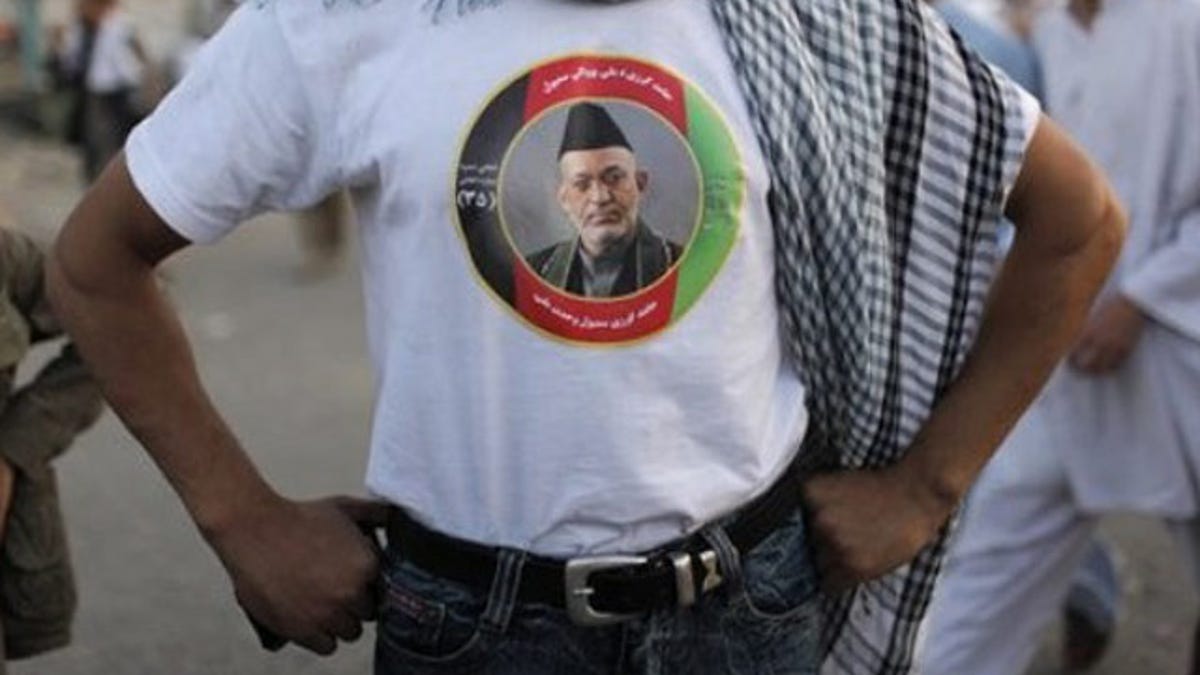
AP
It would be a miracle if Afghanistan's presidential election goes smoothly. It's a country that hasn't progressed much in the last 1500 years; despite being at the world's crossroads since the reign of Darius II in the 5th Century BC. In fact, it's a miracle Afghanistan is having elections at all -- it's a country where only a quarter of the people can read, over ten percent of rural women die in childbirth, and a third of the population suffers from malnutrition. It's has been wracked by civil war and violence for more than three decades, and home to some of the fiercest fighters in the world -- who think nothing of doing battle barefoot and in the snow.
A few weeks ago it looked like President Karzai would easily win reelection, despite a general lack of enthusiam for him personally. But recently, opposition candidates have gained ground. It now seems unlikely Karzai will get the requisite 50% to avoid a second, run-off election with his next closest competitor, former Foreign Minister Abdhullah.
The Taliban has pledged to disrupt the elections and to cut off the ink-stained finger of everyone who votes. It won't be a surprise if the Afghan elections are rife with voter fraud, ballot manipulation, and election day violence. If Karzai does claim a majority of the vote, opposition candidates will cry foul and could well take to the streets, Iran-style. If he doesn't win, and a run-off election is called for two months hence, Afghanistan's government will be in limbo at exactly the wrong time, as the US offensive against the militants heats up.
Yet, regardless of the election's outcome, it will take an even bigger miracle to turn things around in the Afghan War.
General Stanley McChrystal, Obama's new, handpicked commander, is due to deliver a 60-day war assessment in the next few weeks. Some involved in that report say it recommends expanding the size of the Afghan National Army, changing U.S. strategy from counter-terrorism to counter-insurgency, and intensifying efforts to root out corruption and the narcotics trade. But will it recommend a U.S. troop surge?
The election and McChrystal's report will force Obama to make some tough decisions:
1) will he start winding down militarily, perhaps in favor of increased civilian aid? In effect turn Afghanistan over to the Afghans to work out?
2) will he leave things more or less as they are now, with a slightly increased U.S. troop level? Some are calling this the Rumsfeld strategy -- send in just enough troops to keep from being defeated, but not enough to win, which risks keeping things exactly as they are for years and years ahead.
3) or will he double down on Afghanistan, like Bush did with Iraq, and greatly increase our troop presence in order to tip the balance?
Before he makes that decision, President Obama needs to answer some basic questions he has avoided so far which, in fairness, President Bush avoided too.
What is our goal in Afghanistan? To win the hearts and minds of the people? or to defeat and destroy Al Qaeda and the Taliban? Obama has declared both to be our goals, yet achieving them requires very different, competing tactics. Hunting down and killing militants inevitably results in civilian casualties. Winning hearts and minds means often times militants get away to fight another day.
Who are we fighting in Afghanistan? Al Qaeda has decamped over the boarder to Pakistan -- where they hope to destabilize the government in its nuclear arsenal. As for "the Taliban," there are really several subsets of them -- the Pakistan Taliban, the Afghan Taliban, followers of Hekmatyar, regional warlords and narco-traffickers, who fight each other as much as they fight us.
Who are we supporting? Are there echoes of Vietnam in Afghanistan? Are we seen, yet again, as supporting corrupt, incompetent, unpopular leaders? Karzai's brother is one of the leading drug lords in Afghanistan; Human Rights Watch has accused Karzai's running mate of being a torturer, rapist and murderer. Are these the people we're expecting the new Afghan army to defend?
Finally, whatever happens in Afghanistan pales in importance to Pakistan and its nuclear weapons. Even if we manage to defeat the militants, win the hearts and minds of the people, and serve as midwives to a self-sustaining democracy in Afghanistan, it could all be for naught if Pakistan falls to extremists and its nuclear arsenal ends up in the hands of jihadists bent on destroying America.
President Obama has some tough calls to make in the next month or so, and Afghanistan's elections are just the first step in the process.
Kathleen Troia "K.T." McFarland served in national security posts in the Nixon, Ford and Reagan Administrations. She is a Senior Advisor to the Foundation for the Defense of Democracies, and the author of DEFCON-3 by KT, a FOX News.com video blog.
